Conservative Parties and the Birth of Democracy
By Daniel Ziblatt
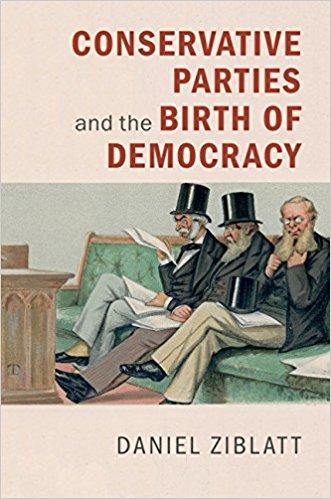 How do democracies form and what makes them die? Daniel Ziblatt revisits this timely and classic question in a wide-ranging historical narrative that traces the evolution of modern political democracy in Europe from its modest beginnings in 1830s Britain to Adolf Hitler's 1933 seizure of power in Weimar Germany. Based on rich historical and quantitative evidence, the book offers a major reinterpretation of European history and the question of how stable political democracy is achieved. The barriers to inclusive political rule, Ziblatt finds, were not inevitably overcome by unstoppable tides of socioeconomic change, a simple triumph of a growing middle class, or even by working class collective action. Instead, political democracy's fate surprisingly hinged on how conservative political parties—the historical defenders of power, wealth, and privilege—recast themselves and coped with the rise of their own radical right. With striking modern parallels, the book has vital implications for today's new and old democracies under siege. (Read more at Cambridge University Press)
How do democracies form and what makes them die? Daniel Ziblatt revisits this timely and classic question in a wide-ranging historical narrative that traces the evolution of modern political democracy in Europe from its modest beginnings in 1830s Britain to Adolf Hitler's 1933 seizure of power in Weimar Germany. Based on rich historical and quantitative evidence, the book offers a major reinterpretation of European history and the question of how stable political democracy is achieved. The barriers to inclusive political rule, Ziblatt finds, were not inevitably overcome by unstoppable tides of socioeconomic change, a simple triumph of a growing middle class, or even by working class collective action. Instead, political democracy's fate surprisingly hinged on how conservative political parties—the historical defenders of power, wealth, and privilege—recast themselves and coped with the rise of their own radical right. With striking modern parallels, the book has vital implications for today's new and old democracies under siege. (Read more at Cambridge University Press)
Weatherhead Center Faculty Associate Daniel Ziblatt is a professor of government, Harvard University.
The Chessboard and the Web
By Anne-Marie Slaughter
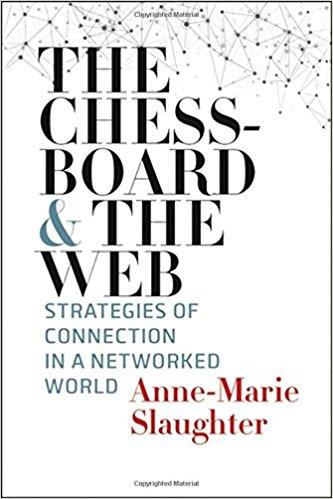 In 1961, Thomas Schelling’s The Strategy of Conflict used game theory to radically reenvision the US-Soviet relationship and establish the basis of international relations for the rest of the Cold War. Now, Anne-Marie Slaughter—one of Foreign Policy’s Top 100 Global Thinkers from 2009 to 2012, and the first woman to serve as director of the State Department Office of Policy Planning—applies network theory to develop a new set of strategies for the post-Cold War world. While chessboard-style competitive relationships still exist—US-Iranian relations, for example—many other situations demand that we look not at individual entities but at their links to one another. We must learn to understand, shape, and build on those connections. (Read more at Yale University Press)
In 1961, Thomas Schelling’s The Strategy of Conflict used game theory to radically reenvision the US-Soviet relationship and establish the basis of international relations for the rest of the Cold War. Now, Anne-Marie Slaughter—one of Foreign Policy’s Top 100 Global Thinkers from 2009 to 2012, and the first woman to serve as director of the State Department Office of Policy Planning—applies network theory to develop a new set of strategies for the post-Cold War world. While chessboard-style competitive relationships still exist—US-Iranian relations, for example—many other situations demand that we look not at individual entities but at their links to one another. We must learn to understand, shape, and build on those connections. (Read more at Yale University Press)
Weatherhead Center alum Anne-Marie Slaughter is president and CEO of New America. She was the former director of policy planning at the US State Department.
Realizing Roma Rights
Edited by Jacqueline Bhabha, Andrzej Mirga, and Margareta Matache
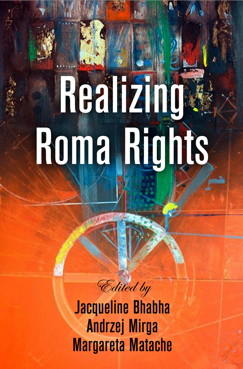 Realizing Roma Rights investigates anti-Roma racism and documents a growing Roma-led political movement engaged in building a more inclusive and just Europe. The book brings to the forefront voices of leading and emerging Romani scholars, from established human rights experts to policy and advocacy leaders with deep experience.
Realizing Roma Rights investigates anti-Roma racism and documents a growing Roma-led political movement engaged in building a more inclusive and just Europe. The book brings to the forefront voices of leading and emerging Romani scholars, from established human rights experts to policy and advocacy leaders with deep experience.
Realizing Roma Rights offers detailed accounts of anti-Roma racism, political and diplomatic narratives chronicling the development of European and American policy, and critical examination of Roma-related discourse and policies in contemporary Europe. It also investigates the complex role of the European Union as a driver of progressive change and a flawed implementer of fundamental rights. (Read more at University of Pennsylvania Press)
Read our Epicenter blog post on this book.
Weatherhead Center Faculty Associate Jacqueline Bhabha is the Professor of the Practice of Health and Human Rights, Harvard T.H. Chan School of Public Health.
The Law of Nations in Global History
By C. H. Alexandrowicz; Edited by David Armitage and Jennifer Pitts
 The history and theory of international law have been transformed in recent years by post-colonial and post-imperial critiques of the universalistic claims of Western international law. The origins of those critiques lie in the often overlooked work of the remarkable Polish-British lawyer-historian C. H. Alexandrowicz (1902–75). This volume collects Alexandrowicz's shorter historical writings, on subjects from the law of nations in pre-colonial India to the New International Economic Order of the 1970s, and presents them as a challenging portrait of early modern and modern world history seen through the lens of the law of nations. (Read more at Oxford University Press)
The history and theory of international law have been transformed in recent years by post-colonial and post-imperial critiques of the universalistic claims of Western international law. The origins of those critiques lie in the often overlooked work of the remarkable Polish-British lawyer-historian C. H. Alexandrowicz (1902–75). This volume collects Alexandrowicz's shorter historical writings, on subjects from the law of nations in pre-colonial India to the New International Economic Order of the 1970s, and presents them as a challenging portrait of early modern and modern world history seen through the lens of the law of nations. (Read more at Oxford University Press)
Weatherhead Center Faculty Associate David Armitage is the Lloyd C. Blankfein Professor of History, Harvard University.
Paradoxes of Green: Landscapes of a City-State
By Gareth Doherty
 This innovative multidisciplinary study considers the concept of green from multiple perspectives—aesthetic, architectural, environmental, political, and social—in the Kingdom of Bahrain, where green has a long and deep history of appearing cooling, productive, and prosperous—a radical contrast to the hot and hostile desert. Although green is often celebrated in cities as a counter to gray urban environments, green has not always been good for cities. Similarly, manifestation of the color green in arid urban environments is often in direct conflict with the practice of green from an environmental point of view. This paradox is at the heart of the book. In arid environments such as Bahrain, the contradiction becomes extreme and even unsustainable. (Read more at University of California Press)
This innovative multidisciplinary study considers the concept of green from multiple perspectives—aesthetic, architectural, environmental, political, and social—in the Kingdom of Bahrain, where green has a long and deep history of appearing cooling, productive, and prosperous—a radical contrast to the hot and hostile desert. Although green is often celebrated in cities as a counter to gray urban environments, green has not always been good for cities. Similarly, manifestation of the color green in arid urban environments is often in direct conflict with the practice of green from an environmental point of view. This paradox is at the heart of the book. In arid environments such as Bahrain, the contradiction becomes extreme and even unsustainable. (Read more at University of California Press)
Read our Epicenter blog post on this book.
Weatherhead Center Faculty Associate Gareth Doherty is an assistant professor of landscape architecture, Harvard Graduate School of Design.
Social Policy Expansion in Latin America
By Candelaria Garay
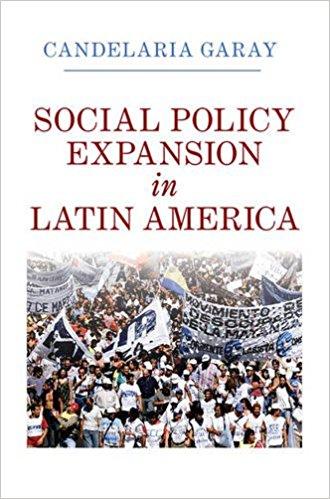 Throughout the twentieth century, much of the population in Latin America lacked access to social protection. Since the 1990s, however, social policy for millions of outsiders—rural, informal, and unemployed workers and dependents—has been expanded dramatically. Social Policy Expansion in Latin America shows that the critical factors driving expansion are electoral competition for the vote of outsiders and social mobilization for policy change. The balance of partisan power and the involvement of social movements in policy design explain cross-national variation in policy models, in terms of benefit levels, coverage, and civil society participation in implementation. The book draws on in-depth case studies of policy making in Argentina, Brazil, Chile, and Mexico over several administrations and across three policy areas: health care, pensions, and income support. Secondary case studies illustrate how the theory applies to other developing countries. (Read more at Cambridge University Press)
Throughout the twentieth century, much of the population in Latin America lacked access to social protection. Since the 1990s, however, social policy for millions of outsiders—rural, informal, and unemployed workers and dependents—has been expanded dramatically. Social Policy Expansion in Latin America shows that the critical factors driving expansion are electoral competition for the vote of outsiders and social mobilization for policy change. The balance of partisan power and the involvement of social movements in policy design explain cross-national variation in policy models, in terms of benefit levels, coverage, and civil society participation in implementation. The book draws on in-depth case studies of policy making in Argentina, Brazil, Chile, and Mexico over several administrations and across three policy areas: health care, pensions, and income support. Secondary case studies illustrate how the theory applies to other developing countries. (Read more at Cambridge University Press)
Weatherhead Center Faculty Associate Candelaria Garay is an assistant professor of public policy, Harvard Kennedy School.
Herbert C. Kelman: A Pioneer in the Social Psychology of Conflict Analysis and Resolution
Edited by Herbert C. Kelman and Ronald J. Fisher
 This edited volume presents selected papers capturing Herbert Kelman’s unique and seminal contributions to the social psychology of conflict analysis and resolution, with a special emphasis on the utility of concepts for understanding and constructively addressing violent and intractable conflicts. Central concepts covered include perceptual processes, basic human needs, group and normative processes, social identity, and intergroup trust, which form the basis for developing interactive methods of conflict resolution. (Read more at Springer)
This edited volume presents selected papers capturing Herbert Kelman’s unique and seminal contributions to the social psychology of conflict analysis and resolution, with a special emphasis on the utility of concepts for understanding and constructively addressing violent and intractable conflicts. Central concepts covered include perceptual processes, basic human needs, group and normative processes, social identity, and intergroup trust, which form the basis for developing interactive methods of conflict resolution. (Read more at Springer)
Weatherhead Center Faculty Associate (emeritus) Herbert C. Kelman is the Richard Clarke Cabot Professor of Social Ethics, Emeritus, Harvard University.
The Truth about Crime: Sovereignty, Knowledge, Social Order
By Jean Comaroff and John L. Comaroff
 In this book, renowned anthropologists Jean and John L. Comaroff make a startling but absolutely convincing claim about our modern era: it is not by our arts, our politics, or our science that we understand ourselves—it is by our crimes. Surveying an astonishing range of forms of crime and policing—from petty thefts to the multibillion-dollar scams of too-big-to-fail financial institutions to the collateral damage of war—they take readers into the disorder of the late modern world. Looking at recent transformations in the triangulation of capital, the state, and governance that have led to an era where crime and policing are ever more complicit, they offer a powerful meditation on the new forms of sovereignty, citizenship, class, race, law, and political economy of representation that have arisen. (Read more at The University of Chicago Press)
In this book, renowned anthropologists Jean and John L. Comaroff make a startling but absolutely convincing claim about our modern era: it is not by our arts, our politics, or our science that we understand ourselves—it is by our crimes. Surveying an astonishing range of forms of crime and policing—from petty thefts to the multibillion-dollar scams of too-big-to-fail financial institutions to the collateral damage of war—they take readers into the disorder of the late modern world. Looking at recent transformations in the triangulation of capital, the state, and governance that have led to an era where crime and policing are ever more complicit, they offer a powerful meditation on the new forms of sovereignty, citizenship, class, race, law, and political economy of representation that have arisen. (Read more at The University of Chicago Press)
Weatherhead Center Faculty Associate Jean Comaroff is the Alfred North Whitehead Professor of African and African American Studies and of Anthropology, Harvard University. Weatherhead Center Faculty Associate John L. Comaroff is the Hugh K. Foster Professor of African and African American Studies and of Anthropology, Harvard University.
Synthetic: How Life Got Made
By Sophia Roosth
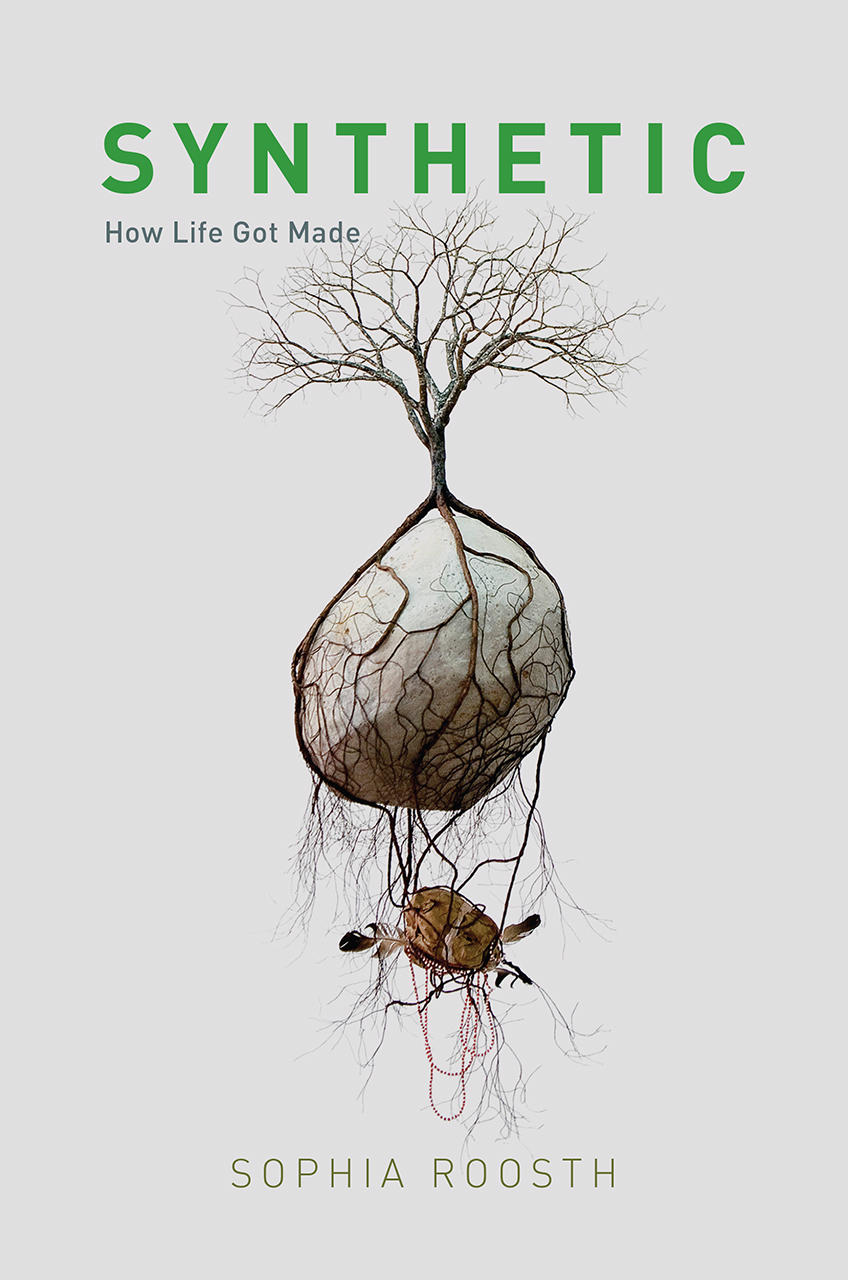 In the final years of the twentieth century, émigrés from engineering and computer science devoted themselves to biology and resolved that if the aim of biology is to understand life, then making life would yield better theories than experimentation. Armed with the latest biotechnology techniques, these scientists treated biological media as elements for design and manufacture: viruses named for computers, bacterial genomes encoding passages from James Joyce, chimeric yeast buckling under the metabolic strain of genes harvested from wormwood, petunias, and microbes from Icelandic thermal pools. (Read more at The University of Chicago Press)
In the final years of the twentieth century, émigrés from engineering and computer science devoted themselves to biology and resolved that if the aim of biology is to understand life, then making life would yield better theories than experimentation. Armed with the latest biotechnology techniques, these scientists treated biological media as elements for design and manufacture: viruses named for computers, bacterial genomes encoding passages from James Joyce, chimeric yeast buckling under the metabolic strain of genes harvested from wormwood, petunias, and microbes from Icelandic thermal pools. (Read more at The University of Chicago Press)
Weatherhead Center Faculty Associate Sophia Roosth is an associate professor of the history of science, Harvard University.
Russia: What Everyone Needs to Know
By Timothy J. Colton
 Russia: What Everyone Needs to Know provides fundamental information about the origins, evolution, and current affairs of the Russian state and society. The story begins with Russia's geographic endowment, proceeds through its experiences as a kingdom and empire, and continues through the USSR's three-quarters of a century, and finally the shocking breakup of that regime a generation ago. (Read more at Oxford University Press)
Russia: What Everyone Needs to Know provides fundamental information about the origins, evolution, and current affairs of the Russian state and society. The story begins with Russia's geographic endowment, proceeds through its experiences as a kingdom and empire, and continues through the USSR's three-quarters of a century, and finally the shocking breakup of that regime a generation ago. (Read more at Oxford University Press)
Weatherhead Center Faculty Associate and Harvard Academy Senior Scholar Timothy J. Colton is the Morris and Anna Feldberg Professor of Government and Russian Studies, Harvard University.
Civil Wars: A History in Ideas
By David Armitage
 We think we know civil war when we see it. Yet ideas of what it is, and what it isn’t, have a long and contested history, from its fraught origins in republican Rome to debates in early modern Europe to our present day. Defining the term is acutely political, for ideas about what makes a war “civil” often depend on whether one is a ruler or a rebel, victor or vanquished, sufferer or outsider. Calling a conflict a civil war can shape its outcome by determining whether outside powers choose to get involved or stand aside: from the American Revolution to the war in Iraq, pivotal decisions have depended on such shifts of perspective. (Read more at Penguin Random House)
We think we know civil war when we see it. Yet ideas of what it is, and what it isn’t, have a long and contested history, from its fraught origins in republican Rome to debates in early modern Europe to our present day. Defining the term is acutely political, for ideas about what makes a war “civil” often depend on whether one is a ruler or a rebel, victor or vanquished, sufferer or outsider. Calling a conflict a civil war can shape its outcome by determining whether outside powers choose to get involved or stand aside: from the American Revolution to the war in Iraq, pivotal decisions have depended on such shifts of perspective. (Read more at Penguin Random House)
Read our Epicenter blog post on this book.
Weatherhead Center Faculty Associate David Armitage is the Lloyd C. Blankfein Professor of History, Harvard University.
Demanding Justice in the Global South: Claiming Rights
Edited by Jean Grugel, Jewellord Nem Singh, Lorenza Fontana, and Anders Uhlin
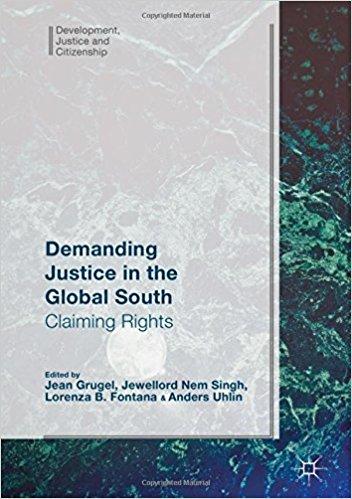 The politics of claiming rights and strategies of mobilisation exhibited by marginalised social groups lie at the heart of this volume. Theoretically, the authors aims to foster a holistic and multi-faceted understanding of how social and economic justice is claimed, either through formal, corporatist or organised mechanisms, or through ad hoc, informal, or individualised practices, as well as the implications of these distinctive activist strategies. The collection emphasises both the difficulties of political mobilisation and the distinctive methods employed by various social groups across a variety of contexts to respond and overcome these challenges. Crucially, the authors’ approach involves a conceptualisation of social movements and local mobilisation in terms of the language of rights and justice claims-making through more organised as well as everyday political practices. In so doing, the book bridges the literature on contentious politics, the politics of claiming social justice, and everyday politics of resistance. (Read more at Palgrave Macmillan)
The politics of claiming rights and strategies of mobilisation exhibited by marginalised social groups lie at the heart of this volume. Theoretically, the authors aims to foster a holistic and multi-faceted understanding of how social and economic justice is claimed, either through formal, corporatist or organised mechanisms, or through ad hoc, informal, or individualised practices, as well as the implications of these distinctive activist strategies. The collection emphasises both the difficulties of political mobilisation and the distinctive methods employed by various social groups across a variety of contexts to respond and overcome these challenges. Crucially, the authors’ approach involves a conceptualisation of social movements and local mobilisation in terms of the language of rights and justice claims-making through more organised as well as everyday political practices. In so doing, the book bridges the literature on contentious politics, the politics of claiming social justice, and everyday politics of resistance. (Read more at Palgrave Macmillan)
Weatherhead Center Marie Skłodowska-Curie Fellow Lorenza Fontana is a research associate, Open University.
Insider Threats
Edited by Matthew Bunn and Scott D. Sagan
 High-security organizations around the world face devastating threats from insiders—trusted employees with access to sensitive information, facilities, and materials. From Edward Snowden to the Fort Hood shooter to the theft of nuclear materials, the threat from insiders is on the front page and at the top of the policy agenda. Insider Threats offers detailed case studies of insider disasters across a range of different types of institutions, from biological research laboratories, to nuclear power plants, to the U.S. Army. Matthew Bunn and Scott D. Sagan outline cognitive and organizational biases that lead organizations to downplay the insider threat, and they synthesize "worst practices" from these past mistakes, offering lessons that will be valuable for any organization with high security and a lot to lose. (Read more at Cornell University Press)
High-security organizations around the world face devastating threats from insiders—trusted employees with access to sensitive information, facilities, and materials. From Edward Snowden to the Fort Hood shooter to the theft of nuclear materials, the threat from insiders is on the front page and at the top of the policy agenda. Insider Threats offers detailed case studies of insider disasters across a range of different types of institutions, from biological research laboratories, to nuclear power plants, to the U.S. Army. Matthew Bunn and Scott D. Sagan outline cognitive and organizational biases that lead organizations to downplay the insider threat, and they synthesize "worst practices" from these past mistakes, offering lessons that will be valuable for any organization with high security and a lot to lose. (Read more at Cornell University Press)
Weatherhead Center Faculty Associate Matthew Bunn is a professor of practice, Harvard Kennedy School.
On the Move: Changing Mechanisms of Mexico-U.S. Migration
By Filiz Garip
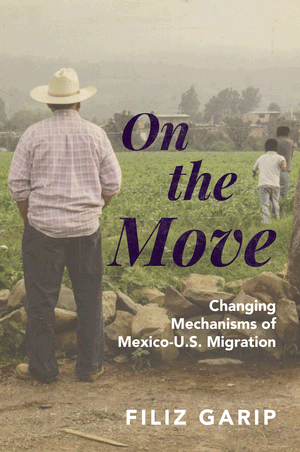 Why do Mexicans migrate to the United States? Is there a typical Mexican migrant? Beginning in the 1970s, survey data indicated that the average migrant was a young, unmarried man who was poor, undereducated, and in search of better employment opportunities. This is the general view that most Americans still hold of immigrants from Mexico. On the Move argues that not only does this view of Mexican migrants reinforce the stereotype of their undesirability, but it also fails to capture the true diversity of migrants from Mexico and their evolving migration patterns over time. (Read more at Princeton University Press)
Why do Mexicans migrate to the United States? Is there a typical Mexican migrant? Beginning in the 1970s, survey data indicated that the average migrant was a young, unmarried man who was poor, undereducated, and in search of better employment opportunities. This is the general view that most Americans still hold of immigrants from Mexico. On the Move argues that not only does this view of Mexican migrants reinforce the stereotype of their undesirability, but it also fails to capture the true diversity of migrants from Mexico and their evolving migration patterns over time. (Read more at Princeton University Press)
Weatherhead Center alum Filiz Garip is a professor of anthropology, Cornell University.
The Man with the Poison Gun
By Serhii Plokhy
 Late in the summer of 1961, a KGB assassin defected to West Germany. Bogdan Stashinsky had already travelled on numerous occasions to Munich, where he'd single-handedly tracked down and killed enemies of the communist regime. His weapon, a unique, top-secret design, killed without leaving a trace.
Late in the summer of 1961, a KGB assassin defected to West Germany. Bogdan Stashinsky had already travelled on numerous occasions to Munich, where he'd single-handedly tracked down and killed enemies of the communist regime. His weapon, a unique, top-secret design, killed without leaving a trace.
Just hours before the border closed and work began on the Berlin Wall, Stashinsky crossed into West and spilled his secrets to the authorities. His trial revealed a gripping tale of exploding parcels, fake identities, forbidden love and a daring midnight escape. His life would serve as inspiration for Ian Fleming's final novel. (Read more at One World Publications)
Weatherhead Center Faculty Associate Serhii Plokhy is the Mykhailo Hrushevsky Professor of Ukrainian History, Harvard University.
El caso de Sacco y Vanzetti. Los Estados Unidos a juicio (The Case of Sacco and Vanzetti: The United States on Trial)
By Moshik Temkin
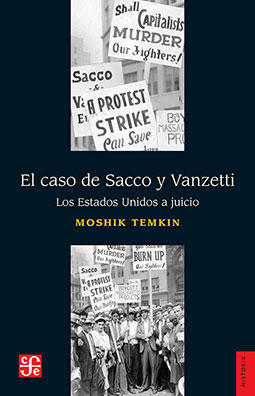 The Case of Sacco and Vanzetti: The United States on Trial is a book that analyzes the enormous national and international impact of the trial and subsequent execution of the anarchist militants Nicolás Sacco and Bartolomeo Vanzetti. It only contributes to understanding the dramatic social and political struggles that accompanied the famous case, but the divisions and conflicts that continue to manifest in the United States today. (Read more at Fondo de Cultura Económica)
The Case of Sacco and Vanzetti: The United States on Trial is a book that analyzes the enormous national and international impact of the trial and subsequent execution of the anarchist militants Nicolás Sacco and Bartolomeo Vanzetti. It only contributes to understanding the dramatic social and political struggles that accompanied the famous case, but the divisions and conflicts that continue to manifest in the United States today. (Read more at Fondo de Cultura Económica)
Weatherhead Center Faculty Associate Moshik Temkin is an associate professor of public policy, Harvard Kennedy School.
Inheritance of Loss: China, Japan, and the Political Economy of Redemption After Empire
By Yukiko Koga
 How do contemporary generations come to terms with losses inflicted by imperialism, colonialism, and war that took place decades ago? How do descendants of perpetrators and victims establish new relations in today’s globalized economy? With Inheritance of Loss, Yukiko Koga approaches these questions through the unique lens of inheritance, focusing on Northeast China, the former site of the Japanese puppet state Manchukuo, where municipal governments now court Japanese as investors and tourists. As China transitions to a market-oriented society, this region is restoring long-neglected colonial-era structures to boost tourism and inviting former colonial industries to create special economic zones, all while inadvertently unearthing chemical weapons abandoned by the Imperial Japanese Army at the end of World War II. (Read more at The University of Chicago Press)
How do contemporary generations come to terms with losses inflicted by imperialism, colonialism, and war that took place decades ago? How do descendants of perpetrators and victims establish new relations in today’s globalized economy? With Inheritance of Loss, Yukiko Koga approaches these questions through the unique lens of inheritance, focusing on Northeast China, the former site of the Japanese puppet state Manchukuo, where municipal governments now court Japanese as investors and tourists. As China transitions to a market-oriented society, this region is restoring long-neglected colonial-era structures to boost tourism and inviting former colonial industries to create special economic zones, all while inadvertently unearthing chemical weapons abandoned by the Imperial Japanese Army at the end of World War II. (Read more at The University of Chicago Press)
Former Weatherhead Center Academy Scholar Yukiko Koga is an assistant professor of anthropology, City University of New York’s Hunter College.
Unlikely Partners: Chinese Reformers, Western Economists, and the Making of Global China
By Julian Gewirtz
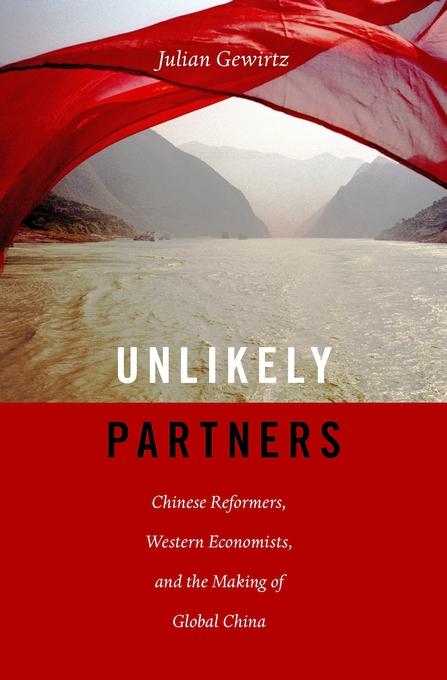 Unlikely Partners recounts the story of how Chinese politicians and intellectuals looked beyond their country’s borders for economic guidance at a key crossroads in the nation’s tumultuous twentieth century. Julian Gewirtz offers a dramatic tale of competition for influence between reformers and hardline conservatives during the Deng Xiaoping era, bringing to light China’s productive exchanges with the West. (Read more at Harvard University Press)
Unlikely Partners recounts the story of how Chinese politicians and intellectuals looked beyond their country’s borders for economic guidance at a key crossroads in the nation’s tumultuous twentieth century. Julian Gewirtz offers a dramatic tale of competition for influence between reformers and hardline conservatives during the Deng Xiaoping era, bringing to light China’s productive exchanges with the West. (Read more at Harvard University Press)
Former Weatherhead Center Undergraduate Associate Julian Gewirtz is a Rhodes Scholar and doctoral candidate, Oxford University.
Rogue Empires: Contracts and Conmen in Europe’s Scramble for Africa
By Steven Press
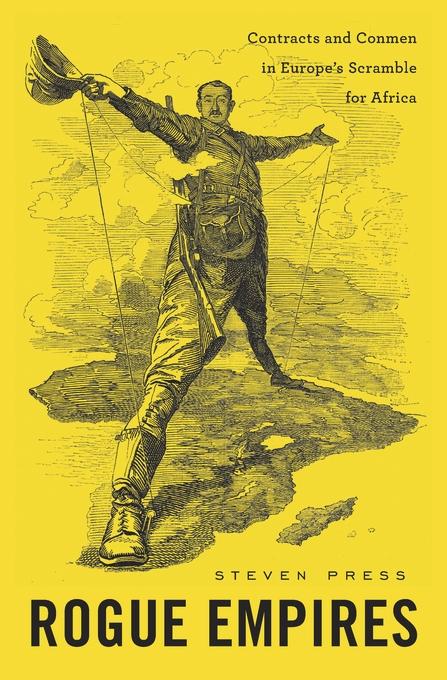 In the 1880s, Europeans descended on Africa and grabbed vast swaths of the continent, using documents, not guns, as their weapon of choice. Rogue Empires follows a paper trail of questionable contracts to discover the confidence men whose actions touched off the Scramble for Africa. Many of them were would-be kings who sought to establish their own autonomous empires across the African continent—often at odds with traditional European governments which competed for control. (Read more at Harvard University Press)
In the 1880s, Europeans descended on Africa and grabbed vast swaths of the continent, using documents, not guns, as their weapon of choice. Rogue Empires follows a paper trail of questionable contracts to discover the confidence men whose actions touched off the Scramble for Africa. Many of them were would-be kings who sought to establish their own autonomous empires across the African continent—often at odds with traditional European governments which competed for control. (Read more at Harvard University Press)
Former Weatherhead Center Graduate Student Associate Steven Press is an assistant professor of history, Stanford University.
Empowering All Students At Scale
Edited by Fernando M. Reimers
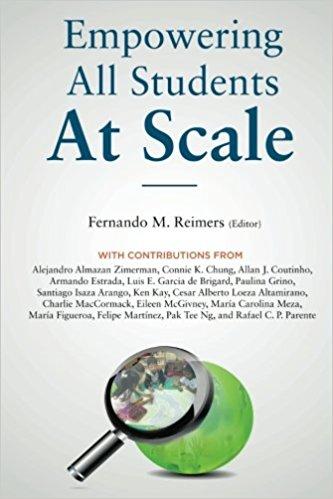 The global movement to educate all children has produced one of the most remarkable silent revolutions experienced by humanity, integrating most children and youth into institutions invented to pass on to them what each generation considers valuable, and to help them develop the competencies to improve the world. Changes in a range of domains, from technology to politics, from the ways in which we communicate and associate, to the ways in which we produce goods and services, continue to expand our aspirations for how schools should prepare the young to invent the future. There is much innovation worldwide responding to this aspiration, and the need to bring such innovations to scale so they benefit all children. The contributors to this book explain what the opportunities and challenges are to scale educational change to make schools relevant to the demands of our times. Based on a Think Tank convened by the Global Education Innovation Initiative at Harvard University, this book aims to stimulate broad social dialogue on how to support students and teachers to live fulfilling lives in the volatility and complexity of our times.
The global movement to educate all children has produced one of the most remarkable silent revolutions experienced by humanity, integrating most children and youth into institutions invented to pass on to them what each generation considers valuable, and to help them develop the competencies to improve the world. Changes in a range of domains, from technology to politics, from the ways in which we communicate and associate, to the ways in which we produce goods and services, continue to expand our aspirations for how schools should prepare the young to invent the future. There is much innovation worldwide responding to this aspiration, and the need to bring such innovations to scale so they benefit all children. The contributors to this book explain what the opportunities and challenges are to scale educational change to make schools relevant to the demands of our times. Based on a Think Tank convened by the Global Education Innovation Initiative at Harvard University, this book aims to stimulate broad social dialogue on how to support students and teachers to live fulfilling lives in the volatility and complexity of our times.
Weatherhead Center Faculty Associated Fernando M. Reimers is the Ford Foundation Professor of International Education, Harvard Graduate School of Education.
